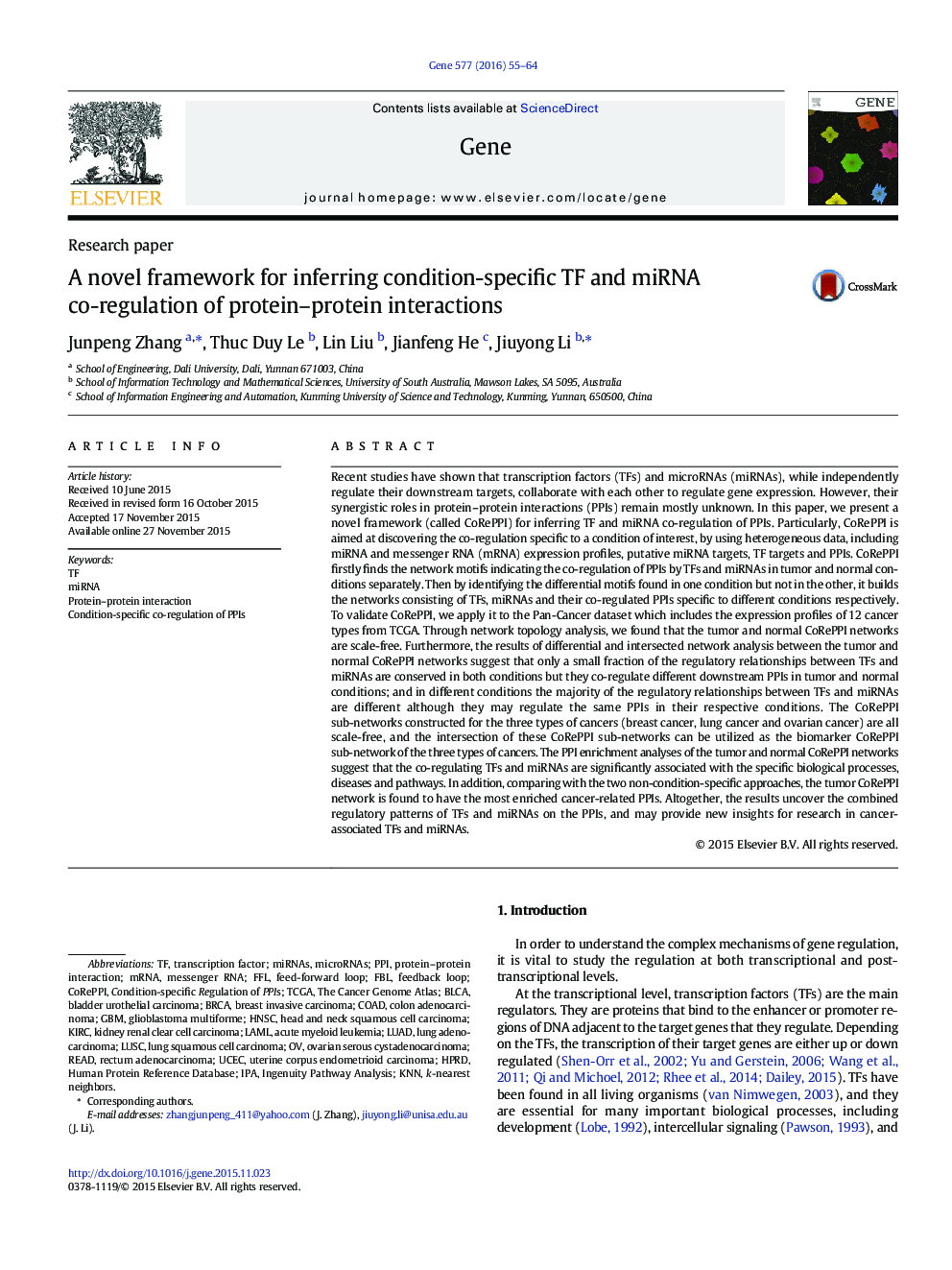| کد مقاله | کد نشریه | سال انتشار | مقاله انگلیسی | نسخه تمام متن |
|---|---|---|---|---|
| 2815203 | 1159859 | 2016 | 10 صفحه PDF | دانلود رایگان |

• CoRePPI is proposed to infer condition-specific TF and miRNA co-regulation of PPIs.
• We evaluate the method on the expression profiles of 12 cancer types from TCGA.
• The tumor and normal CoRePPI networks are scale-free.
• Most TF-miRNA or miRNA-TF pairs choose to co-regulate PPIs in a specific condition.
• The tumor CoRePPI network is found to have the most enriched cancer-related PPIs.
Recent studies have shown that transcription factors (TFs) and microRNAs (miRNAs), while independently regulate their downstream targets, collaborate with each other to regulate gene expression. However, their synergistic roles in protein–protein interactions (PPIs) remain mostly unknown. In this paper, we present a novel framework (called CoRePPI) for inferring TF and miRNA co-regulation of PPIs. Particularly, CoRePPI is aimed at discovering the co-regulation specific to a condition of interest, by using heterogeneous data, including miRNA and messenger RNA (mRNA) expression profiles, putative miRNA targets, TF targets and PPIs. CoRePPI firstly finds the network motifs indicating the co-regulation of PPIs by TFs and miRNAs in tumor and normal conditions separately. Then by identifying the differential motifs found in one condition but not in the other, it builds the networks consisting of TFs, miRNAs and their co-regulated PPIs specific to different conditions respectively. To validate CoRePPI, we apply it to the Pan-Cancer dataset which includes the expression profiles of 12 cancer types from TCGA. Through network topology analysis, we found that the tumor and normal CoRePPI networks are scale-free. Furthermore, the results of differential and intersected network analysis between the tumor and normal CoRePPI networks suggest that only a small fraction of the regulatory relationships between TFs and miRNAs are conserved in both conditions but they co-regulate different downstream PPIs in tumor and normal conditions; and in different conditions the majority of the regulatory relationships between TFs and miRNAs are different although they may regulate the same PPIs in their respective conditions. The CoRePPI sub-networks constructed for the three types of cancers (breast cancer, lung cancer and ovarian cancer) are all scale-free, and the intersection of these CoRePPI sub-networks can be utilized as the biomarker CoRePPI sub-network of the three types of cancers. The PPI enrichment analyses of the tumor and normal CoRePPI networks suggest that the co-regulating TFs and miRNAs are significantly associated with the specific biological processes, diseases and pathways. In addition, comparing with the two non-condition-specific approaches, the tumor CoRePPI network is found to have the most enriched cancer-related PPIs. Altogether, the results uncover the combined regulatory patterns of TFs and miRNAs on the PPIs, and may provide new insights for research in cancer-associated TFs and miRNAs.
Figure optionsDownload high-quality image (141 K)Download as PowerPoint slide
Journal: Gene - Volume 577, Issue 1, 10 February 2016, Pages 55–64